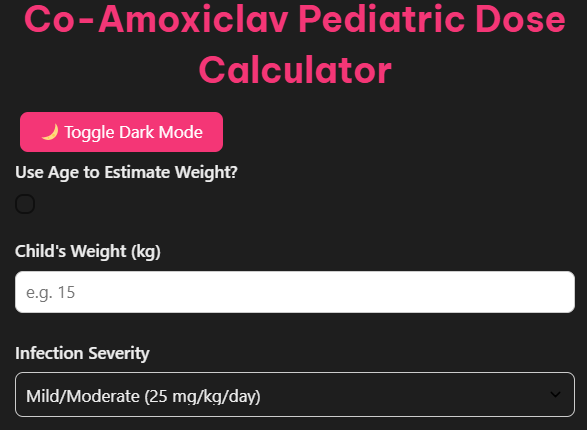Co-Amoxiclav Pediatric Dose Calculator
Results
Total Daily Dose: -
Per Dose: -
Volume per Dose: -
Amoxicillin / Clavulanic: -
Dosing Schedule
Ensuring that children receive the correct dosage of medication is critical to their health and recovery. When it comes to antibiotics like Co-Amoxiclav, accuracy in dosing is not only important but also potentially life-saving. Whether you’re a parent caring for their child, a healthcare professional, or someone keen to understand pediatric medication dosages.
Tip: Need paracetamol dosing too? Try our Paracetamol Dosage Calculator.
What Is Co-Amoxiclav and Why Is It Used in Pediatrics?
Co-Amoxiclav is a combination antibiotic made up of amoxicillin (a penicillin-type antibiotic) and clavulanic acid, which enhances amoxicillin’s effectiveness against bacteria resistant to standard antibiotics. Its wide spectrum of activity makes it effective for treating a variety of pediatric bacterial infections, including:
- Acute otitis media (ear infections)
- Respiratory tract infections (such as community-acquired pneumonia)
- Urinary tract infections
- Skin infections
- Soft tissue infections
Co-Amoxiclav is commonly prescribed in pediatric care due to its proven efficacy in fighting bacterial infections while maintaining safety when properly dosed.
But here’s the challenge: children’s dosages are heavily weight- and condition-specific. That’s where a dose calculator becomes an invaluable tool for parents and healthcare professionals alike.
Factors Influencing Co-Amoxiclav Dosage
Proper dosing in pediatrics depends on several factors:
1. Weight
Dosage calculations typically start with a weight-based formula, expressed in milligrams per kilogram (mg/kg). Children with higher body weights may require higher doses.
2. Age
While weight is the main determinant, a child’s age can provide additional context for assessing kidney function or possible contraindications.
3. Type of Infection
The severity and type of infection play a major role in selecting the proper dosing:
- Mild infections may require dosages at the lower end of the spectrum.
- Severe infections like pneumonia usually call for higher dosages within safety limits.
4. Strength of Suspension
Co-Amoxiclav comes in various strengths, such as:
- Amoxicillin 125 mg/5 mL + Clavulanic Acid 31.25 mg/5 mL
- Amoxicillin 250 mg/5 mL + Clavulanic Acid 62.5 mg/5 mL
- Amoxicillin 400 mg/5 mL + Clavulanic Acid 57 mg/5 mL
Each formulation contains specific amounts of amoxicillin (the key component for dosage calculation).
Understanding these nuances ensures the right therapeutic outcomes while minimizing potential side effects.
How to Use Our Co-Amoxiclav Pediatric Dose Calculator

A free, intuitive Co-Amoxiclav pediatric dose calculator simplifies dosage calculations and reduces the risk of errors. Here’s a step-by-step guide to using one effectively:
Step 1. Enter Your Child’s Weight
Input the child’s weight in kilograms. Accuracy is key, so weigh your child before entering values.
Step 2. Select the Infection Type
Using the dropdown menu, choose the condition being treated (e.g., “mild infection,” “community-acquired pneumonia,” etc.).
Step 3. Choose the Suspension Strength
Pick the Co-Amoxiclav suspension strength prescribed by your healthcare provider. For instance, if the prescribed strength is 250 mg/5 mL, select that option in the calculator.
Step 4. View Dosage Calculation
The calculator will provide dosage details such as:
- Milligrams (mg) required per dose
- Milliliters (mL) required per dose for the chosen suspension strength
Step 5. Confirm Maximum Dose Limits
If the calculated dose exceeds the maximum allowable daily dose (4 g of amoxicillin), the calculator will issue an alert to consult a doctor.
Step 6. Re-Check and Double-Verify
While calculators are accurate tools, re-check the results and consult your pediatrician before administering the medication.
Crucial Dosage Ranges for Common Pediatric Conditions
Below are some general guidelines for Co-Amoxiclav dosing, organized by indication:
1. General dosing (1 month – 18 years)
- Typical range: 15-30 mg/kg (maximum 625 mg), 3 times daily.
2. Mild to moderate infections
- Dosage: 25 mg/kg/day, administered twice daily (BID).
3. Severe infections
- Dosage: 45 mg/kg/day, administered BID.
4. Acute otitis media
- Recommended range: 80-90 mg/kg/day.
5. Community-acquired pneumonia
- Recommended range: 80-100 mg/kg/day.
6. Urinary tract infections
- Recommended range based on amoxicillin component: 80-90 mg/kg/day.
Important Note: Always round doses to the nearest measurable value (e.g., milliliters) based on the preparation being used.
Real-life Example:
Sarah’s 4-year-old child, weighing 15 kg, was prescribed Co-Amoxiclav for an ear infection. Using a calculator, Sarah determined that her child needed 6 mL per dose of a 250 mg/5 mL suspension.
Her pediatrician confirmed the calculation, ensuring safety and efficacy.
Safety Considerations for Accurate Dosage
Here are critical elements to consider before administering Co-Amoxiclav:
- Allergies: Avoid Co-Amoxiclav in children allergic to penicillin.
- Renal or Hepatic Impairment: Consult a doctor for adjusted doses if your child has kidney or liver issues.
- Maximum Dose Alerts: Never exceed the daily amoxicillin ceiling of 4 g or the per-dose cap of 625 mg for suspensions.
- Drug Interactions: Watch out for adverse reactions with methotrexate and other medications.
Emily’s Story: Emily accidentally administered a double dose of Co-Amoxiclav to her 2-year-old son. Though her son was okay, her experience highlights the importance of using a dose calculator and consulting a doctor when in doubt.
Consultation Reminder: Always verify the calculations with your healthcare provider to ensure your child’s safety.
Share This with Fellow Parents
Accurately dosing pediatric medication can be daunting, but with the right tools and knowledge, it doesn’t have to be. Share this calculator with fellow parents who might also benefit from using a Co-Amoxiclav pediatric dosage calculator. Providing accurate information means better safety for children everywhere.